- Home
- Ken Follett
Fall of Giants Page 5
Fall of Giants Read online
Page 5
Chapter 5
CHAPTER FIVE - April 1914
The German embassy was a grand mansion in Carlton House Terrace, one of London's most elegant streets. It looked across a leafy garden to the pillared portico of the Athenaeum, the club for gentleman intellectuals. At the back, its stables opened on the Mall, the broad avenue that ran from Trafalgar Square to Buckingham Palace.
Walter von Ulrich did not live there-yet. Only the ambassador himself, Prince Lichnowsky, had that privilege. Walter, a mere military attache, lived in a bachelor apartment ten minutes' walk away in Piccadilly. However, he hoped that one day he might inhabit the ambassador's grand private apartment within the embassy. Walter was not a prince, but his father was a close friend of Kaiser Wilhelm II. Walter spoke English like an Old Etonian, which he was. He had spent two years in the army and three years at the war academy before joining the Foreign Service. He was twenty-eight years old, and a rising star.
He was not attracted only by the prestige and glory of being an ambassador. He felt passionately that there was no higher calling than to serve his country. His father felt the same.
They disagreed about everything else.
They stood in the hall of the embassy and looked at one another. They were the same height, but Otto was heavier, and bald, and his mustache was the old-fashioned soup-strainer type, whereas Walter had a modern toothbrush. Today they were identically dressed in black velvet suits with knee breeches, silk stockings, and buckled shoes. Both wore swords and cocked hats. Amazingly, this was the normal costume for presentation at Britain's royal court. "We look as if we should be on the stage," Walter said. "Ridiculous outfits. "
"Not at all," said his father. "It's a splendid old custom. "
Otto von Ulrich had spent much of his life in the German army. A young officer in the Franco-Prussian War, he had led his company across a pontoon bridge at the Battle of Sedan. Later, Otto had been one of the friends the young Kaiser Wilhelm had turned to after he broke with Bismarck, the Iron Chancellor. Now Otto had a roving brief, visiting European capitals like a bee landing on flowers, sipping the nectar of diplomatic intelligence and taking it all back to the hive. He believed in the monarchy and the Prussian military tradition.
Walter was just as patriotic, but he thought Germany had to become modern and egalitarian. Like his father, he was proud of his country's achievements in science and technology, and of the hardworking and efficient German people; but he thought they had a lot to learn-democracy from the liberal Americans, diplomacy from the sly British, and the art of gracious living from the stylish French.
Father and son left the embassy and went down a broad flight of steps to the Mall. Walter was to be presented to King George V, a ritual that was considered a privilege even though it brought with it no particular benefits. Junior diplomats such as he were not normally so honored, but his father had no compunction about pulling strings to advance Walter's career.
"Machine guns make all handheld weapons obsolete," Walter said, continuing an argument they had begun earlier. Weapons were his specialty, and he felt strongly that the German army should have the latest in firepower.
Otto thought differently. "They jam, they overheat, and they miss. A man with a rifle takes careful aim. But give him a machine gun and he'll wield it like a garden hose. "
"When your house is on fire, you don't throw water on it in cupfuls, no matter how accurate. You want a hose. "
Otto wagged his finger. "You've never been in battle-you have no idea what it's like. Listen to me, I know. "
This was how their arguments often ended.
Walter felt his father's generation was arrogant. He understood how they had got that way. They had won a war, they had created the German Empire out of Prussia and a group of smaller independent monarchies, and then they had made Germany one of the world's most prosperous countries. Of course they thought they were wonderful. But it made them incautious.
A few hundred yards along the Mall, Walter and Otto turned into St. James's Palace. This sixteenth-century brick pile was older and less impressive than neighboring Buckingham Palace. They gave their names to a doorman who was dressed as they were.
Walter was mildly anxious. It was so easy to make a mistake of etiquette-and there were no minor errors when you were dealing with royalty.
Otto spoke to the doorman in English. "Is Senor Diaz here?"
"Yes, sir, he arrived a few moments ago. "
Walter frowned. Juan Carlos Diego Diaz was a representative of the Mexican government. "Why are you interested in Diaz?" he said in German as they walked on through a series of rooms decorated with wall displays of swords and guns.
"The British Royal Navy is converting its ships from coal power to oil. "
Walter nodded. Most advanced nations were doing the same. Oil was cheaper, cleaner, and easier to deal with-you just pumped it in, instead of employing armies of black-faced stokers. "And the British get oil from Mexico. "
"They have bought the Mexican oil wells in order to secure supplies for their navy. "
"But if we interfere in Mexico, what would the Americans think?"
Otto tapped the side of his nose. "Listen and learn. And, whatever you do, don't say anything. "
The men about to be presented were waiting in an anteroom. Most had on the same velvet court dress, though one or two were in the comic-opera costumes of nineteenth-century generals, and one-presumably a Scot-wore full-dress uniform with a kilt. Walter and Otto strolled around the room, nodding to familiar faces on the diplomatic circuit, until they came to Diaz, a thickset man with a mustache that curled up at the tips.
After the usual pleasantries Otto said: "You must be glad that President Wilson has lifted the ban on arms sales to Mexico. "
"Arms sales to the rebels," said Diaz, as if correcting him.
The American president, always inclined to take a moral stand, had refused to recognize General Huerta, who had come to power after the assassination of his predecessor. Calling Huerta a murderer, Wilson was backing a rebel group, the Constitutionalists.
Otto said: "If arms may be sold to the rebels, surely they may be sold to the government?"
Diaz looked startled. "Are you telling me that Germany would be willing to do that?"
"What do you need?"
"You must already know that we are desperate for rifles and ammunition. "
"We could talk further about it. "
Walter was as startled as Diaz. This would cause trouble. He said: "But, Father, the United States-"
"One moment!" His father held up a hand to silence him.
Diaz said: "By all means let us talk further. But tell me: what other subjects might come up?" He had guessed that Germany would want something in return.
The door to the throne room opened, and a footman came out carrying a list. The presentation was about to start. But Otto continued unhurriedly: "In time of war, a sovereign country is entitled to withhold strategic supplies. "
Diaz said: "You're talking about oil. " It was the only strategic supply Mexico had.
Otto nodded.
Diaz said: "So you would give us guns-"
"Sell, not give," Otto murmured.
"You would sell us guns now, in exchange for a promise that we would withhold oil from the British in the event of war. " Diaz was clearly not used to the elaborate waltz of normal diplomatic conversation.
"It might be worth discussing. " In the language of diplomacy that was a yes.
The footman called out: "Monsieur Honore de Picard de la Fontaine!" and the presentations began.
Otto gave Diaz a direct look. "What I'd like to know from you is how such a proposal might be received in Mexico City. "
"I believe President Huerta would be interested. "
"So, if the German minister to Mexico, Admiral Paul von Hintze, were to make a formal approach to your president, he would not receive a rebuff. "
Walter could
tell that his father was determined to get an unequivocal answer to this. He did not want the German government to risk the embarrassment of having such an offer flung back in their faces.
In Walter's anxious view, embarrassment was not the greatest danger to Germany in this diplomatic ploy. It risked making an enemy of the United States. But it was frustratingly difficult to point this out in the presence of Diaz.
Answering the question, Diaz said: "He would not be rebuffed. "
"You're sure?" Otto insisted.
"I guarantee it. "
Walter said: "Father, may I have a word-"
But the footman cried: "Herr Walter von Ulrich!"
Walter hesitated, and his father said: "Your turn. Go on!"
Walter turned away and stepped into the Throne Room.
The British liked to overawe their guests. The high coffered ceiling had diamond-patterned coving, the red plush walls were hung with enormous portraits, and at the far end the throne was overhung by a high canopy with dark velvet drapes. In front of the throne stood the king in a naval uniform. Walter was pleased to see the familiar face of Sir Alan Tite at the king's side-no doubt whispering names in the royal ear.
Walter approached and bowed. The king said: "Good to see you again, von Ulrich. "
Walter had rehearsed what he would say. "I hope Your Majesty found the discussions at Tŷ Gwyn interesting. "
"Very! Although the party was dreadfully overshadowed, of course. "
"By the pit disaster. Indeed, so tragic. "
"I look forward to our next meeting. "
Walter understood this was his dismissal. He walked backward, bowing repeatedly in the required manner, until he reached the doorway.
His father was waiting for him in the next room.
"That was quick!" Walter said.
"On the contrary, it took longer than normal," said Otto. "Usually the king says: 'I'm glad to see you in London,' and that's the end of the conversation. "
They left the palace together. "Admirable people, the British, in many ways, but soft," said Otto as they walked up St. James's Street to Piccadilly. "The king is ruled by his ministers, the ministers are subject to Parliament, and members of Parliament are chosen by the ordinary men. What sort of way is that to run a country?"
Walter did not rise to that provocation. He believed that Germany's political system was out of date, with its weak parliament that could not stand up to the kaiser or the generals; but he had had that argument with his father many times, and besides, he was still worried by the conversation with the Mexican envoy. "What you said to Diaz was risky," he said. "President Wilson won't like us selling rifles to Huerta. "
"What does it matter what Wilson thinks?"
"The danger is that we will make a friend of a weak nation, Mexico, by making an enemy of a strong nation, the United States. "
"There's not going to be a war in America. "
Walter supposed that was true, but all the same he was uneasy. He did not like the idea of his country being at odds with the United States.
In his apartment they took off their antiquated costumes and dressed in tweed suits with soft-collared shirts and brown trilby hats. Back in Piccadilly they boarded a motorized omnibus heading east.
Otto had been impressed by Walter's invitation to meet the king at Tŷ Gwyn in January. "Earl Fitzherbert is a good connection," he had said. "If the Conservative Party comes to power he may be a minister, perhaps foreign secretary one day. You must keep up the friendship. "
Walter had been inspired. "I should visit his charity clinic, and make a small donation. "
"Excellent idea. "
"Perhaps you would like to come with me?"
His father had taken the bait. "Even better. "
Walter had an ulterior motive, but his father was all unsuspecting.
The bus took them past the theaters of the Strand, the newspaper offices of Fleet Street, and the banks of the financial district. Then the streets became narrower and dirtier. Top hats and bowlers were replaced by cloth caps. Horse-drawn vehicles predominated, and motorcars were few. This was the East End.
They got off at Aldgate. Otto looked around disdainfully. "I didn't know you were taking me to the slums," he said.
"We're going to a clinic for the poor," Walter replied. "Where would you expect it to be?"
"Does Earl Fitzherbert himself come here?"
"I suspect he just pays for it. " Walter knew perfectly well that Fitz had never been there in his life. "But he will of course hear about our visit. "
They zigzagged through backstreets to a nonconformist chapel. A hand-painted wooden sign read: "Calvary Gospel Hall. " Pinned to the board was a sheet of paper with the words:
Baby Clinic
Free of Charge
Today and
every Wednesday
Walter opened the door and they went in.
Otto made a disgusted noise, then took out a handkerchief and held it to his nose. Walter had been there before, so he had been expecting the smell, but even so it was startlingly unpleasant. The hall was full of ragged women and half-naked children, all filthy dirty. The women sat on benches and the children played on the floor. At the far end of the room were two doors, each with a temporary label, one saying "Doctor" and the other "Patroness. "
Near the door sat Fitz's aunt Herm, listing names in a book. Walter introduced his father. "Lady Hermia Fitzherbert, my father, Herr Otto von Ulrich. "
At the other end of the room, the door marked "Doctor" opened and a ragged woman came out carrying a tiny baby and a medicine bottle. A nurse looked out and said: "Next, please. "
Lady Hermia consulted her list and called: "Mrs. Blatsky and Rosie!"
An older woman and a girl went into the doctor's surgery.
Walter said: "Wait here a moment, please, Father, and I'll fetch the boss. "
He hurried to the far end, stepping around the toddlers on the floor. He tapped on the door marked "Patroness," and walked in.
The room was little more than a cupboard, and indeed there was a mop and bucket in a corner. Lady Maud Fitzherbert sat at a small table writing in a ledger. She wore a simple dove-gray dress and a broad-brimmed hat. She looked up, and the smile that lit up her face when she saw Walter was bright enough to bring tears to his eyes. She leaped out of her chair and threw her arms around him.
He had been looking forward to this all day. He kissed her mouth, which opened to him immediately. He had kissed several women, but she was the only one he had ever known to press her body against him this way. He felt embarrassed, fearing that she would feel his erection, and he arched his body away; but she only pressed more closely, as if she really wanted to feel it, so he gave in to the pleasure.
Maud was passionate about everything: poverty, women's rights, music-and Walter. He felt amazed and privileged that she had fallen in love with him.
She broke the kiss, panting. "Aunt Herm will become suspicious," she said.
Walter nodded. "My father is outside. "
Maud patted her hair and smoothed her dress. "All right. "
Walter opened the door and they went back into the hall. Otto was chatting amiably to Hermia: he liked respectable old ladies.
"Lady Maud Fitzherbert, may I present my father, Herr Otto von Ulrich. "
Otto bowed over her hand. He had learned not to click his heels: the English thought it comical.
Walter watched them size one another up. Maud smiled as if amused, and Walter guessed she was wondering if this was what he would look like in years to come. Otto took in Maud's expensive cashmere dress and the fashionable hat with approval. So far, so good.
Otto did not know that they were in love. Walter's plan was that his father would get to know Maud first. Otto approved of wealthy women doing charitable work, and insisted that Walter's mother and his sister visit poor families at Zumwald, their country estate in East Prussia. He would
find out what a wonderful and exceptional woman Maud was, then his defenses would be down by the time he learned that Walter wanted to marry her.
It was a little foolish, Walter knew, to be so nervous. He was twenty-eight years old: he had a right to choose the woman he loved. But eight years ago he had fallen in love with another woman. Tilde had been passionate and intelligent, like Maud, but she was seventeen and a Catholic. The von Ulrichs were Protestants. Both sets of parents had been angrily hostile to the romance, and Tilde had been unable to defy her father. Now Walter had fallen in love with an unsuitable woman for the second time. It was going to be difficult for his father to accept a feminist and a foreigner. But Walter was older and craftier now, and Maud was stronger and more independent than Tilde had been.
All the same, he was terrified. He had never felt like this about a woman, not even Tilde. He wanted to marry Maud and spend his life with her; in fact he could not imagine being without her. And he did not want his father to make trouble about it.
Maud was on her best behavior. "It is very kind of you to visit us, Herr von Ulrich," she said. "You must be tremendously busy. For a trusted confidant of a monarch, as you are to your kaiser, I imagine work has no end. "
Otto was flattered, as she had intended. "I'm afraid this is true," he said. "However your brother, the earl, is such a long-standing friend of Walter's that I was very keen to come. "
"Let me introduce you to our doctor. " Maud led the way across the room and knocked at the surgery door. Walter was curious: he had never met the doctor. "May we come in?" she called.
They stepped into what must normally have been the pastor's office, furnished with a small desk and a shelf of ledgers and hymnbooks. The doctor, a handsome young man with black eyebrows and a sensual mouth, was examining Rosie Blatsky's hand. Walter felt a twinge of jealousy: Maud spent whole days with this attractive fellow.
Maud said: "Dr. Greenward, we have a most distinguished visitor. May I present Herr von Ulrich?"
Otto said stiffly: "How do you do?"
"The doctor works here for no fee," Maud said. "We're most grateful to him. "
Greenward nodded curtly. Walter wondered what was causing the evident tension between his father and the doctor.
The doctor returned his attention to his patient. There was an angry-looking cut across her palm, and the hand and wrist were swollen. He looked at the mother and said: "How did she do this?"
The child answered. "My mother doesn't speak English," she said. "I cut my hand at work. "
"And your father?"
"My father's dead. "
Maud said quietly: "The clinic is for fatherless families, though in practise we never turn anyone away. "
Greenward said to Rosie: "How old are you?"
"Eleven. "
Walter murmured: "I thought children were not allowed to work under thirteen. "
"There are loopholes in the law," Maud replied.
Greenward said: "What work do you do?"
"I clean up at Mannie Litov's garment factory. There was a blade in the sweepings. "
"Whenever you cut yourself, you must wash the wound and put on a clean bandage. Then you have to change the bandage every day so that it doesn't get too dirty. " Greenward's manner was brisk, but not unkind.
The mother barked a question at the daughter in heavily accented Russian. Walter could not understand her, but he got the gist of the child's reply, which was a translation of what the doctor had said.
The doctor turned to his nurse. "Clean the hand and bandage it, please. " To Rosie he said: "I'm going to give you some ointment. If your arm swells more you must come back and see me next week. Do you understand?"
"Yes, sir. "
"If you let the infection get worse, you may lose your hand. "
Tears came to Rosie's eyes.
Greenward said: "I'm sorry to frighten you, but I want you to understand how important it is to keep your hand clean. "
The nurse prepared a bowl of what was presumably antiseptic fluid. Walter said: "May I express my admiration and respect for your work here, Doctor. "
"Thank you. I'm happy to give my time, but we need to buy medical supplies. Any help you can offer will be much appreciated. "
Maud said: "We must leave the doctor to get on-there are at least twenty patients waiting. "
The visitors left the surgery. Walter was bursting with pride. Maud had more than compassion. When told of young children working in sweatshops, many aristocratic ladies could wipe away a tear with an embroidered handkerchief; but Maud had the determination and the nerve to give real help.
And, he thought, she loves me!
Maud said: "May I offer you some refreshment, Herr von Ulrich? My office is cramped, but I do have a bottle of my brother's best sherry. "
"Most kind, but we must be going. "
That was a bit quick, Walter thought. Maud's charm had stopped working on Otto. He had a nasty feeling that something had gone wrong.
Otto took out his pocketbook and extracted a banknote. "Please accept a modest contribution to your excellent work here, Lady Maud. "
"How generous!" she said.
Walter gave her a similar note. "Perhaps I may be allowed to donate something too. "
"I appreciate anything you can offer me," she said. Walter hoped he was the only one to notice the sly look she gave him as she said it.
Otto said: "Please be sure to give my respects to Earl Fitzherbert. "
They took their leave. Walter felt worried about his father's reaction. "Isn't Lady Maud wonderful?" he said breezily as they walked back toward Aldgate. "Fitz pays for everything, of course, but Maud does all the work. "
"Disgraceful," Otto said. "Absolutely disgraceful. "
Walter had sensed he was grumpy, but this astonished him. "What on earth do you mean? You approve of well-born ladies doing something to help the poor!"
"Visiting sick peasants with a few groceries in a basket is one thing," Otto said. "But I am appalled to see the sister of an earl in a place like that with a Jew doctor!"
"Oh, God," Walter groaned. Of course; Dr. Greenward was Jewish. His parents had probably been Germans called Grunwald. Walter had not met the doctor before today, and anyway might not have noticed or cared about his race. But Otto, like most men of his generation, thought such things important. Walter said: "Father, the man is working for nothing-Lady Maud cannot afford to refuse the help of a perfectly good doctor just because he's Jewish. "
Otto was not listening. "Fatherless families-where did she get that phrase?" he said with disgust. "The spawn of prostitutes is what she means. "
Walter felt heartsick. His plan had gone horribly wrong. "Don't you see how brave she is?" he said miserably.
"Certainly not," said Otto. "If she were my sister, I'd give her a good thrashing. "
{II}
There was a crisis in the White House.
In the small hours of the morning of April 21, Gus Dewar was in the West Wing. This new building provided badly needed office space, leaving the original White House free to be used as a residence. Gus was sitting in the president's study near the Oval Office, a small, drab room lit by a dim bulb. On the desk was the battered Underwood portable typewriter used by Woodrow Wilson to write his speeches and press releases.
Gus was more interested in the phone. If it rang, he had to decide whether to wake the president.
A telephone operator could not make such a decision. On the other hand, the president's senior advisers needed their sleep. Gus was the lowliest of Wilson's advisers, or the highest of his clerks, depending on point of view. Either way, it had fallen to him to sit all night by the phone to decide whether to disturb the president's slumbers-or those of the first lady, Ellen Wilson, who was suffering from a mysterious illness. Gus was nervous that he might say or do the wrong thing. Suddenly all his expensive education seemed superfluous: even at Harvard there had never been
a class in when to wake the president. He was hoping the phone would never ring.
Gus was there because of a letter he had written. He had described to his father the royal party at Tŷ Gwyn, and the after-dinner discussion about the danger of war in Europe. Senator Dewar had found the letter so interesting and amusing that he had shown it to his friend Woodrow Wilson, who had said: "I'd like to have that boy in my office. " Gus had been taking a year off between Harvard, where he had studied international law, and his first job at a Washington law firm. He had been halfway through a world tour, but he had eagerly cut short his travels and rushed home to serve his president.
Nothing fascinated Gus so much as the relationships between nations-the friendships and hatreds, the alliances and the wars. As a teenager he had attended sessions of the Senate Committee on Foreign Relations-his father was a member-and he had found it more fascinating than a play at the theater. "This is how countries create peace and prosperity-or war, devastation, and famine," his father had said. "If you want to change the world, then foreign relations is the field in which you can do the most good-or evil. "
And now Gus was in the middle of his first international crisis.
An overzealous Mexican government official had arrested eight American sailors in the port of Tampico. The men had already been released, the official had apologized, and the trivial incident might have ended there. But the squadron commander, Admiral Mayo, had demanded a twenty-one-gun salute. President Huerta had refused. Piling on the pressure, Wilson had threatened to occupy Veracruz, Mexico's biggest port.
And so America was on the brink of war. Gus greatly admired the high-principled Woodrow Wilson. The president was not content with the cynical view that one Mexican bandit was pretty much like another. Huerta was a reactionary who had killed his predecessor, and Wilson was looking for a pretext to unseat him. Gus was thrilled that a world leader would say it was not acceptable for men to achieve power through murder. Would there come a day when that principle was accepted by all nations?
The crisis had been cranked up a notch by the Germans. A German ship called the Ypiranga was approaching Veracruz with a cargo of rifles and ammunition for Huerta's government.
Tension had been high all day, but now Gus was struggling to stay awake. On the desk in front of him, illuminated by a green-shaded lamp, was a typewritten report from army intelligence on the strength of the rebels in Mexico. Intelligence was one of the army's smaller departments, with only two officers and two clerks, and the report was scrappy. Gus's mind kept wandering to Caroline Wigmore.
When he arrived in Washington he had called to see Professor Wigmore, one of his Harvard teachers who had moved to Georgetown University. Wigmore had not been at home, but his young second wife was there. Gus had met Caroline several times at campus events, and had been strongly drawn to her quietly thoughtful demeanor and her quick intelligence. "He said he needed to order new shirts," she said, but Gus could see the strain on her face, and then she added: "But I know he's gone to his mistress. " Gus had wiped her tears with his handkerchief and she had kissed his lips and said: "I wish I were married to someone trustworthy. "
Caroline had turned out to be surprisingly passionate. Although she would not allow sexual intercourse, they did everything else. She had shuddering orgasms when he did no more than stroke her.
Their affair had been going on for only a month, but already Gus knew that he wanted her to divorce Wigmore and marry him. But she would not hear of it, even though she had no children. She said it would ruin Gus's career, and she was probably right. It could not be done discreetly, for the scandal would be too juicy-the attractive wife leaving a well-known professor and rapidly marrying a wealthy younger man. Gus knew exactly what his mother would say about such a marriage: "It's understandable, if the professor was unfaithful, but one can't meet the woman socially, of course. " The president would be embarrassed, and so would the kind of people a lawyer wanted for clients. It would certainly put paid to any hopes Gus might have had of following his father into the Senate.
Gus told himself he did not care. He loved Caroline and he would rescue her from her husband. He had plenty of money, and when his father died he would be a millionaire. He would find some other career. Perhaps he might become a journalist, reporting from foreign capitals.
All the same he felt a stabbing pain of regret. He had just got a job in the White House, something young men dreamed of. It would be agonizingly hard to give that up, along with all it might lead to.
The phone rang, and Gus was startled by its sudden jangling in the quiet of the West Wing at night. "Oh, my God," he said, staring at it. "Oh, my God, this is it. " He hesitated several seconds, then at last picked up the handset. He heard the fruity voice of Secretary of State William Jennings Bryan. "I have Joseph Daniels on the line with me, Gus. " Daniels was secretary of the navy. "And the president's secretary is listening on an extension. "
"Yes, Mr. Secretary, sir," said Gus. He made his voice calm, but his heart was racing.
"Wake the president, please," said Secretary Bryan.
"Yes, sir. "
Gus went through the Oval Office and out into the Rose Garden in the cool night air. He ran across to the old building. A guard let him in. He hurried up the main staircase and across the hall to the bedroom door. He took a deep breath and knocked hard, hurting his knuckles.
After a moment he heard Wilson's voice. "Who is it?"
"Gus Dewar here, Mr. President," he called. "Secretary Bryan and Secretary Daniels are on the telephone. "
"Just a minute. "
President Wilson came out of the bedroom putting on his rimless glasses, looking vulnerable in pajamas and a dressing gown. He was tall, though not as tall as Gus. At fifty-seven he had dark gray hair. He thought he was ugly, and he was not far wrong. He had a beak of a nose and sticking-out ears, but the thrust of his big chin gave his face a determined look that accurately reflected the strength of character that Gus respected. When he spoke, he showed bad teeth.
"Good morning, Gus," he said amiably. "What's the excitement?"
"They didn't tell me. "
"Well, you'd better listen in on the extension next door. "
Gus hurried into the next room and picked up the phone.
He heard Bryan's sonorous tones. "The Ypiranga is due to dock at ten this morning. "
Gus felt a thrill of apprehension. Surely the Mexican president would cave in now? Otherwise there would be bloodshed.
Bryan read a cable from the American consul in Veracruz. "'Steamer Ypiranga, owned by Hamburg-Amerika line, will arrive tomorrow from Germany with two hundred machine guns and fifteen million cartridges; will go to pier four and start discharging at ten thirty. '"
"Do you realize what this means, Mr. Bryan?" said Wilson, and Gus thought his voice sounded querulous. "Daniels, are you there, Daniels? What do you think?"
Daniels replied: "The munitions should not be permitted to reach Huerta. " Gus was surprised at this tough line from the peace-loving navy secretary. "I can wire Admiral Fletcher to prevent it and take the customs house. "
There was a long pause. Gus was gripping the phone so hard that his hand hurt. At last the president spoke. "Daniels, send this order to Admiral Fletcher: Take Veracruz at once. "
"Yes, Mr. President," said the navy secretary.
And America was at war.
{III}
Gus did not go to bed that night or the following day.
Shortly after eight thirty, Secretary Daniels brought the news that an American warship had blocked the path of the Ypiranga. The German ship, an unarmed freighter, switched its engines to reverse and left the scene. American marines would go ashore at Veracruz later that morning, Daniels said.
Gus was dismayed by the rapidly developing crisis but thrilled to be at the heart of things.
Woodrow Wilson did not shrink from war. His favorite play was Shakespeare's Henry V, and he liked t
o quote the line "If it be a sin to covet honour, I am the most offending soul alive. "
News came in by wireless and cable, and it was Gus's job to take the messages in to the president. At midday the marines took control of the Veracruz customs house.
Shortly afterward, he was told that there was someone to see him-a Mrs. Wigmore.
Gus frowned worriedly. This was indiscreet. Something must be wrong.
He hurried to the lobby. Caroline looked distraught. Although she wore a neat tweed coat and a plain hat, her hair was untidy and her eyes red with crying. Gus was shocked and distressed to see her in this state. "My darling!" he said in a low voice. "What on earth has happened?"
"This is the end," she said. "I can never see you again. I'm so sorry. " She began to cry.
Gus wanted to hug her, but he could not do so there. He had no office of his own. He looked around. The guard at the door was staring at them. There was nowhere they could be private. It was maddening. "Come outside," he said, taking her arm. "We'll walk. "
She shook her head. "No. I'll be all right. Stay here. "
"What has upset you?"
She would not meet his eye, and looked at the floor. "I must be faithful to my husband. I have obligations. "
"Let me be your husband. "
She raised her face, and her yearning look broke his heart. "Oh, how I wish I could. "
"But you can!"
"I have a husband already. "
"He is not faithful to you-why should you be to him?"
She ignored that. "He's accepted a chair at Berkeley. We're moving to California. "
"Don't go. "
"I've made up my mind. "
"Obviously," Gus said flatly. He felt as if he had been knocked down. His chest hurt and he found it hard to breathe. "California," he said. "Hell. "
She saw his acceptance of the inevitable, and she began to recover her composure. "This is our last meeting," she said.
"No!"
"Please listen to me. There's something I want to tell you, and this is my only chance. "
"All right. "
"A month ago I was ready to kill myself. Don't look at me like that, it's true. I thought I was so worthless that no one would care if I died. Then you appeared on my doorstep. You were so affectionate, so courteous, so thoughtful, that you made me think it was worth staying alive. You cherished me. " The tears were streaming down her cheeks, but she kept on. "And you were so happy when I kissed you. If I could give someone that much joy, I couldn't be completely useless, I realized; and that thought kept me going. You saved my life, Gus. May God bless you. "
He almost felt angry. "What does that leave me with?"
"Memories," she said. "I hope you will treasure them as I will treasure mine. "
She turned away. Gus followed her to the door, but she did not look back. She went out, and he let her go.
When she was out of sight he headed automatically for the Oval Office, then changed direction: his mind was in too much of a turmoil for him to be with the president. He went into the men's room for a moment's peace. Fortunately there was no one else there. He washed his face, then looked in the mirror. He saw a thin man with a big head: he was shaped like a lollipop. He had light brown hair and brown eyes, and was not very handsome, but women usually liked him, and Caroline loved him.
Or she had, at least, for a little while.
He should not have let her go. How could he have watched her walk away like that? He should have persuaded her to postpone her decision, think about it, talk to him some more. Perhaps they could have thought of alternatives. But in his heart he knew there were no alternatives. She had already been through all that in her mind, he guessed. She must have lain awake nights, with her husband sleeping beside her, going over and over the situation. She had made up her mind before coming here.
He needed to return to his post. America was at war. But how could he put this out of his mind? When he could not see her, he spent all day looking forward to the next time he could. Now he could not stop thinking about life without her. It already seemed a strange prospect. What would he do?
A clerk came into the men's room, and Gus dried his hands on a towel and returned to his station in the study next to the Oval Office.
A few moments later, a messenger brought him a cable from the American consul in Veracruz. Gus looked at it and said: "Oh, no!" It read: FOUR OF OUR MEN KILLED COMMA TWENTY WOUNDED COMMA FIRING ALL AROUND THE CONSULATE STOP.
Four men killed, Gus thought with horror; four good American men with mothers and fathers, and wives or girlfriends. The news seemed to put his sadness in perspective. At least, he thought, Caroline and I are alive.
He tapped on the door of the Oval Office and handed the cable to Wilson. The president read it and went pale.
Gus looked keenly at him. How did he feel, knowing they were dead because of the decision he had made in the middle of the night?
This was not supposed to happen. The Mexicans wanted freedom from tyrannical governments, didn't they? They should have welcomed the Americans as liberators. What had gone wrong?
Bryan and Daniels showed up a few minutes later, followed by the secretary of war, Lindley Garrison, a man normally more belligerent than Wilson, and Robert Lansing, the State Department counselor. They gathered in the Oval Office to wait for more news.
The president was wired tighter than a violin string. Pale, restless, and twitchy, he paced the floor. It was a pity, Gus thought, that Wilson did not smoke-it might have calmed him.
We all knew there might be violence, Gus thought, but somehow the reality is more shocking than we anticipated.
More details came in sporadically, and Gus handed the messages to Wilson. The news was all bad. Mexican troops had resisted, firing on the marines from their fort. The troops were supported by citizens, who took potshots at Americans from their upstairs windows. In retaliation the USS Prairie, anchored offshore, turned its three-inch guns on the city and shelled it.
Casualties mounted: six Americans killed, eight, twelve-and more wounded. But it was a hopelessly unequal contest, and over a hundred Mexicans died.
The president seemed baffled. "We don't want to fight the Mexicans," he said. "We want to serve them, if we can. We want to serve mankind. "
For the second time in a day, Gus felt knocked off his feet. The president and his advisers had had nothing but good intentions. How had things gone so wrong? Was it really so difficult to do good in international affairs?
A message came from the State Department. The German ambassador, Count Johann von Bernstorff, had been instructed by the kaiser to call on the secretary of state, and wished to know whether nine o'clock tomorrow morning would be convenient. Unofficially, his staff indicated that the ambassador would be lodging a formal protest against the halting of the Ypiranga.
"A protest?" said Wilson. "What the dickens are they talking about?"
Gus saw immediately that the Germans had international law on their side. "Sir, there had been no declaration of war, nor of a blockade, so, strictly speaking, the Germans are correct. "
"What?" Wilson turned to Lansing. "Is that right?"
"We'll double-check, of course," said the State Department counselor. "But I'm pretty sure Gus is right. What we did was contrary to international law. "
"So what does that mean?"
"It means we'll have to apologize. "
"Never!" said Wilson angrily.
But they did.
{IV}
Maud Fitzherbert was surprised to find herself in love with Walter von Ulrich. On the other hand, she would have been surprised to find herself in love with any man. She rarely met one she even liked. Plenty had been attracted to her, especially during her first season as a debutante, but most had quickly been repelled by her feminism. Others had planned to take her in hand-like the scruffy Marquis of Lowther, who had told Fitz that she would see the error of her ways
when she met a truly masterful man. Poor Lowthie, he had been shown the error of his.
Walter thought she was wonderful the way she was. Whatever she did, he marveled. If she espoused extreme points of view, he was impressed by her arguments; when she shocked society by helping unmarried mothers and their children, he admired her courage; and he loved the way she looked in daring fashions.
Maud was bored by wealthy upper-class Englishmen who thought the way society was currently arranged was pretty satisfactory. Walter was different. Coming as he did from a conservative German family, he was surprisingly radical. From where she sat, in the back row of seats in her brother's box at the opera, she could see Walter in the stalls, with a small group from the German embassy. He did not look like a rebel, with his carefully brushed hair, his trim mustache, and his perfectly fitting evening clothes. Even sitting down, he was upright and straight-shouldered. He looked at the stage with intense concentration as Don Giovanni, accused of trying to rape a simple country girl, brazenly pretended to have caught his servant, Leporello, committing the crime.
In fact, she mused, rebel was not the right word for Walter. Although unusually open-minded, Walter was sometimes conventional. He was proud of the great musical tradition of German-speaking people, and got cross with blase London audiences for arriving late, chatting to their friends during the performance, and leaving early. He would be irritated at Fitz, now, for making comments about the soprano's figure to his pal Bing Westhampton, and at Bea for talking to the Duchess of Sussex about Madame Lucille's shop in Hanover Square, where they bought their gowns. She even knew what Walter would say: "They listen to the music only when they have run out of gossip!"
Maud felt the same, but they were in a minority. For most of London's high society, the opera was just one more opportunity to show off clothes and jewels. However, even they fell silent toward the end of Act 1, as Don Giovanni threatened to kill Leporello, and the orchestra played a thunderstorm on drums and double basses. Then, with characteristic insouciance, Don Giovanni released Leporello and walked jauntily away, defying them all to stop him; and the curtain came down.
Walter stood up immediately, looking toward the box, and waved. Fitz waved back. "That's von Ulrich," he said to Bing. "All those Germans are pleased with themselves because they embarrassed the Americans in Mexico. "
Bing was an impish, curly-haired Lothario distantly related to the royal family. He knew little of world affairs, being mainly interested in gambling and drinking in the capital cities of Europe. He frowned and said in puzzlement: "What do the Germans care about Mexico?"
"Good question," Fitz said. "If they think they can win colonies in South America, they're deceiving themselves-the United States will never allow it. "
Maud left the box and went down the grand staircase, nodding and smiling to acquaintances. She knew something like half the people there: London society was a surprisingly small set. On the red-carpeted landing she encountered a group surrounding the slight, dapper figure of David Lloyd George, the chancellor of the Exchequer. "Good evening, Lady Maud," he said with the twinkle that appeared in his bright blue eyes whenever he spoke to an attractive woman. "I hear your royal house party went well. " He had the nasal accent of North Wales, less musical than the South Wales lilt. "But what a tragedy in the Aberowen pit. "
"The bereaved families were much comforted by the king's condolences," Maud said. Among the group was an attractive woman in her twenties. Maud said: "Good evening, Miss Stevenson, how nice to see you again. " Lloyd George's political secretary and mistress was a rebel, and Maud felt drawn to her. In addition, a man was always grateful to people who were polite to his mistress.
Lloyd George spoke to the group. "That German ship delivered the guns to Mexico after all. It simply went to another port and quietly unloaded. So nineteen American troops died for nothing. It's a terrible humiliation for Woodrow Wilson. "
Maud smiled and touched Lloyd George's arm. "Would you explain something to me, Chancellor?"
"If I can, my dear," he said indulgently. Most men were pleased to be asked to explain things, especially to attractive young women, Maud found.
She said: "Why does anyone care what happens in Mexico?"
"Oil, dear lady," Lloyd George replied. "Oil. "
Someone else spoke to him, and he turned away.
Maud spotted Walter. They met at the foot of the staircase. He bowed over her gloved hand, and she had to resist the temptation to touch his fair hair. Her love for Walter had awakened within her a sleeping lion of physical desire, a beast that was both stimulated and tormented by their stolen kisses and furtive fumbles.
"How are you enjoying the opera, Lady Maud?" he said formally, but his hazel eyes said I wish we were alone.
"Very much-the Don has a wonderful voice. "
"For me the conductor goes a little too fast. "
He was the only person she had ever met who took music as seriously as she did. "I disagree," she said. "It's a comedy, so the melodies need to bounce along. "
"But not just a comedy. "
"That's true. "
"Perhaps he will slow down when things turn nasty in act two. "
"You seem to have won some kind of diplomatic coup in Mexico," she said, changing the subject.
"My father is. . . " He searched for words, something that was unusual for him. "Cock-a-hoop," he said after a pause.
"And you are not?"
He frowned. "I worry that the American president may want to get his own back one day. "
At that moment Fitz walked past and said: "Hello, von Ulrich, come and join us in our box, we've got a spare seat. "
"With pleasure!" said Walter.
Maud was delighted. Fitz was just being hospitable: he did not know his sister was in love with Walter. She would have to bring him up to date soon. She was not sure how he would take the news. Their countries were at odds, and although Fitz regarded Walter as a friend, that was a long step from welcoming him as a brother-in-law.
She and Walter walked up the stairs and along the corridor. The back row in Fitz's box had only two seats with a poor view. Without discussion, Maud and Walter took those seats.
A few minutes later the house lights went down. In the half dark, Maud could almost imagine herself alone with Walter. The second act began with the duet between the Don and Leporello. Maud liked the way Mozart made masters and servants sing together, showing the complex and intimate relationships between upper and lower orders. Many dramas dealt only with the upper classes, and portrayed servants as part of the furniture-as many people wished they were.
Bea and the duchess returned to the box during the trio "Ah! Taci, ingiusto core. " Everyone seemed to have exhausted the available topics of conversation, for they talked less and listened more. No one spoke to Maud or Walter, or even turned to look at them, and Maud wondered excitedly whether she might take advantage of the situation. Feeling daring, she reached out and furtively took Walter's hand. He smiled, and stroked her fingers with the ball of his thumb. She wished she could kiss him, but that would be foolhardy.
When Zelina sang her aria "Vedrai, carino" in sentimental three-eight time, an irresistible impulse tempted Maud, and as Zerlina pressed Masetto's hand to her heart, Maud laid Walter's hand on her breast. He gave an involuntary gasp, but no one noticed because Masetto was making similar noises, having just been beaten up by the Don.
She turned his hand so that he could feel her nipple with his palm. He loved her breasts, and touched them whenever he could, which was seldom. She wished it were oftener: she loved it. This was another discovery. Other people had stroked them-a doctor, an Anglican priest, an older girl at dancing class, a man in a crowd-and she had been disturbed and at the same time flattered at the thought that she could arouse people's lust, but she had never enjoyed it until now. She glanced at Walter's face and saw that he was staring at the stage, but there was a glint of perspiration on his forehead. S
he wondered if she was wrong to excite him in this way, when she could not give him satisfaction; but he made no move to withdraw his hand, so she concluded that he liked what she was doing. So did she. But, as always, she wanted more.
What had changed her? She had never been like this. It was him, of course, and the connection she felt with him, an intimacy so intense that she felt she could say anything, do whatever she liked, suppress nothing. What made him so different from every other man who had ever taken a fancy to her? A man such as Lowthie, or even Bing, expected a woman to act like a well-behaved child: to listen respectfully when he was being ponderous, to laugh appreciatively at his wit, to obey when he was masterful, and to give him a kiss whenever he asked. Walter treated her as a grown-up. He did not flirt, or condescend, or show off, and he listened at least as much as he talked.
The music turned sinister as the statue came to life, and the Commendatore stalked into the Don's dining room to a discord that Maud recognized as a diminished seventh. This was the dramatic high point of the opera, and Maud was almost certain no one would look around. Perhaps she could give Walter satisfaction after all, she thought; and the idea made her breathless.
As the trombones blared over the deep bass voice of the Commendatore, she placed her hand on Walter's thigh. She could feel the warmth of his skin through the fine wool of his dress trousers. Still he did not look at her, but she could see that his mouth was open and he was breathing heavily. She slid her hand up his thigh and, as the Don bravely took the Commendatore's hand, she found Walter's stiff penis and grasped it.
She was excited and, at the same time, curious. She had never done this before. She explored it through the fabric of his trousers. It was bigger than she expected and harder, too, more like a piece of wood than a part of the body. How strange, she thought, that such a remarkable physical change should occur just because of a woman's touch. When she was aroused it showed in tiny changes: that almost imperceptible feeling of puffiness, and the dampness inside. For men it was like raising a flag.
She knew what boys did, for she had spied on Fitz when he was fifteen; and now she imitated the action she had seen him perform, the up-and-down movement of the hand, while the Commendatore called upon the Don to repent, and the Don repeatedly refused. Walter was panting, now, but no one could hear because the orchestra was so loud. She was overjoyed that she could please him so much. She watched the backs of the heads of the others in the box, terrified that one of them might look around, but she was too caught up in what she was doing to stop. Walter covered her hand with his own, teaching her how to do it, gripping harder on the downstroke and releasing the pressure on the up, and she imitated what he did. As the Don was dragged into the flames, Walter jerked in his seat. She felt a kind of spasm in his penis-once, twice, and a third time-and then, as the Don died of fright, Walter seemed to slump, exhausted.
Maud suddenly knew that what she had done was completely mad. She quickly withdrew her hand. She flushed with shame. She found she was panting, and tried to breathe normally.
The final ensemble began onstage, and Maud relaxed. She did not know what had possessed her, but she had got away with it. The release of tension made her want to laugh. She suppressed a giggle.
She caught Walter's eye. He was looking at her with adoration. She felt a glow of pleasure. He leaned over and put his lips to her ear. "Thank you," he murmured.
She sighed and said: "It was a pleasure. "

 The Pillars of the Earth
The Pillars of the Earth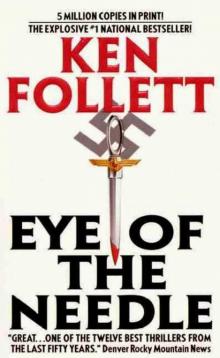 Eye Of The Needle
Eye Of The Needle Lie Down With Lions
Lie Down With Lions Winter of the World
Winter of the World Triple
Triple World Without End
World Without End Fall of Giants
Fall of Giants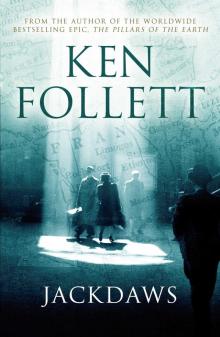 Jackdaws
Jackdaws Hornet Flight
Hornet Flight Whiteout
Whiteout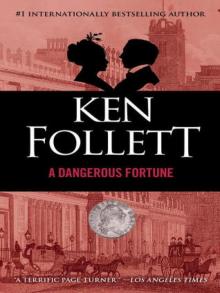 A Dangerous Fortune
A Dangerous Fortune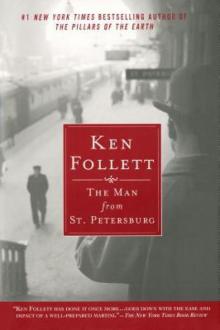 The Man From St. Petersburg
The Man From St. Petersburg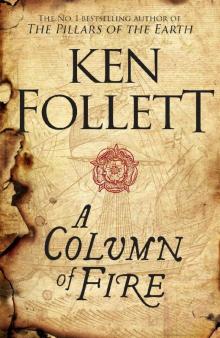 A Column of Fire
A Column of Fire The Hammer of Eden
The Hammer of Eden On Wings of Eagles
On Wings of Eagles The Evening and the Morning
The Evening and the Morning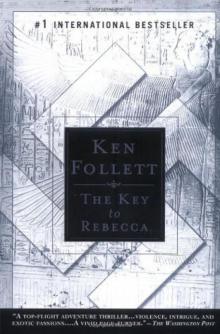 The Key to Rebecca
The Key to Rebecca Code to Zero
Code to Zero Paper Money
Paper Money A Place Called Freedom
A Place Called Freedom The Modigliani Scandal
The Modigliani Scandal Triple (1991)
Triple (1991) A Dangerous Fortune (1994)
A Dangerous Fortune (1994)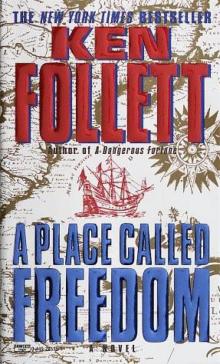 A Place Called Freedom (1995)
A Place Called Freedom (1995) Winter of the World (Century Trilogy 2)
Winter of the World (Century Trilogy 2) Code to Zero (2000)
Code to Zero (2000) On Wings Of Eagles (1990)
On Wings Of Eagles (1990) Storm Island
Storm Island Fall of Giants (The Century Trilogy)
Fall of Giants (The Century Trilogy) the Third Twin (1996)
the Third Twin (1996)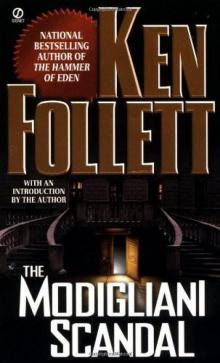 The Modigliani Scandal (1976)
The Modigliani Scandal (1976) Night Over Water
Night Over Water